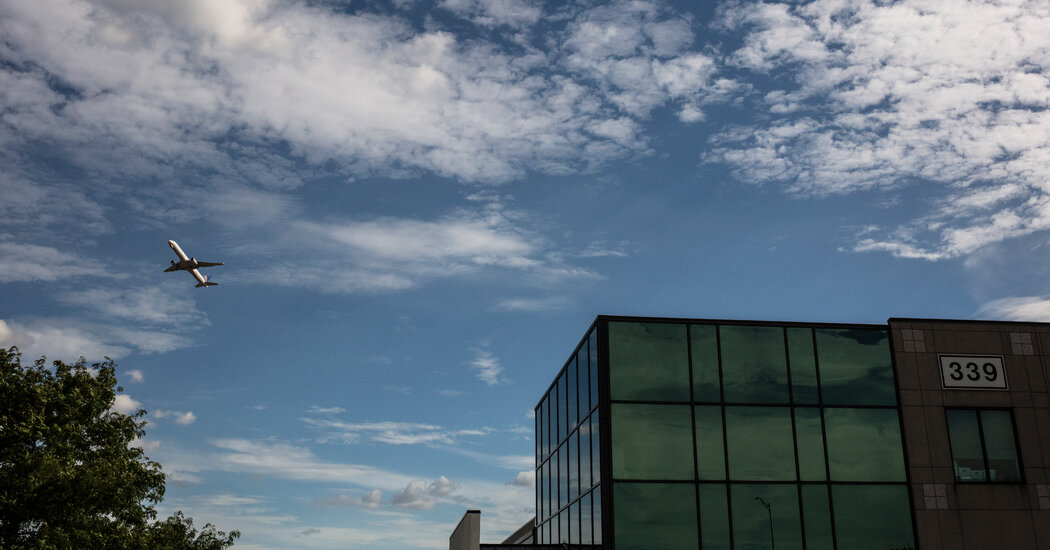For the second time, Amazon’s plans to significantly expand its presence in the New York area have been abandoned after labor and community groups came into opposition.
In 2019, Amazon abruptly canceled plans to build a second New York City headquarters after a barrage of criticism it hadn’t anticipated. This time, the e-commerce giant was unable to secure a deal for a cargo hub at Newark Liberty International Airport.
The project, which is subject to a 20-year lease worth hundreds of millions of dollars, attracted opposition after the Port Authority announced it last summer.
“Unfortunately, the Port Authority and Amazon have failed to agree on the final lease terms and have jointly concluded that further negotiations will not resolve the outstanding issues,” Huntley Lawrence, the Port Authority’s chief operating officer, said in a statement Thursday. .
Affected advocacy groups and unions had said they could not support the lease unless Amazon made a series of concessions, including labor agreements and a zero-emissions benchmark for the facility.
“This win indicates that if Amazon wants to continue growing in New Jersey, it will have to do it on our terms,” said Sara Cullinane, director of Make the Road New Jersey, an advocacy group that had questioned the deal.
Amazon, which expressed confidence in the deal in May, expressed disappointment in a statement, adding that “we are proud of our robust presence in New Jersey and look forward to further investment in the state.”
Amazon had estimated the project would create more than 1,000 jobs, although many of those jobs could still be created if the Port Authority awarded the lease to another company. Two other companies are bidding on the project.
“The growth of air cargo and the redevelopment of airport facilities in a way that benefits both the region and the local community remain a top priority for the Port Authority,” added Mr. Lawrence, the chief operating officer, in his statement.
The greater long-term impact may be on Amazon’s ability to efficiently deliver packages in the Northeast, which it serves with airport hubs near Allentown, Pennsylvania; Hartford, Connecticut; and Baltimore. “Newark was the obvious choice,” said Marc Wulfraat, an industry consultant who closely monitors Amazon’s facilities. “It’s right there on the doorstep of New York City.”
Understand the Unionization Efforts at Amazon
Mr Wulfraat said Amazon could look for other commercial airports in the region, even if their locations are less ideal, to support growing parcel volume.
It was, in part, the company’s notoriety in the state that drew opposition to the project. A report prepared by groups seeking to block it pointed out that the number of Amazon facilities in New Jersey grew to 49 from one between 2013 and 2020, nearly tripling the number of warehouse workers in the state to about 70,000. Over the same period, the median wage for those workers fell to about $44,000 a year, from more than $53,000 a year, adjusted for inflation, according to data from the Labor Department.
New Jersey is one of the more unionized states in the country, with Amazon resisting union efforts at its facilities.
Amazon said the median starting wage for its timepieces is over $18 nationally. The median hourly wage in New Jersey was about $23 last year. The company also cited benefits, which include full health insurance for full-time employees once they start working; a 401(k) plan with a 50 percent business match; and up to 20 weeks of paid parental leave.
The Port Authority announced the proposed lease with Amazon in August, the day the board voted to approve the deal. The authority said it expected the lease to come into effect on or about November 1, according to the minutes of the meeting.
“It was something they tried to sneak in without notifying the community, which was kind of unfortunate,” said Kim Gaddy, executive director of the South Ward Environmental Alliance, which focuses on environmental issues affecting Newark residents.
Under the proposed deal, Amazon has pledged to invest $125 million in the renovation of two airport buildings and pay the Port Authority more than $300 million over 20 years, including $150 million upfront.
In September, the groups led by Ms. Cullinane and Ms. Gaddy, along with other advocacy groups and unions such as the Teamsters and the Retail, Wholesale and Department Store Union, began coordinating their opposition. The groups distributed petitions that gathered thousands of signatures from residents and organized public events such as demonstrations and a march.
The project seemed to stall after the November timetable for finalizing the lease that was passed without any announcement.
In late March, a spokeswoman for Governor Phil Murphy, who had initially praised the deal, said in a statement that “the governor encourages anyone doing business in our state to cooperate in good faith with labor partners.” (The governor’s office declined to comment Thursday.) Other politicians in the state appeared to be growing skeptical after the Amazon Labor Union’s election victory in a Staten Island warehouse this year, a result Amazon is contesting.
Amazon has opened air hubs in recent years to transport products through its own logistics network, rather than relying on third-party suppliers. It prefers to fulfill customer orders with local inventory, for cheaper, faster delivery, but when the product a customer wants is not in a nearby warehouse, it will fly the product to fulfill its shipping promises.
Business expansion gained momentum during the pandemic as e-commerce sales boomed. “We’ve doubled our capacity built in Amazon’s first 25 years in just 24 months,” CEO Andy Jassy told investors in May.
But the company has acknowledged that it was overbuilding, expanding and hiring more than demand requires, and in April it posted its first quarterly loss since 2015. This year, Amazon has pulled out of some investments. “We are trying to postpone construction activities for properties where we don’t need the capacity yet, and we are also going to let some leases expire,” said Mr Jassy.

